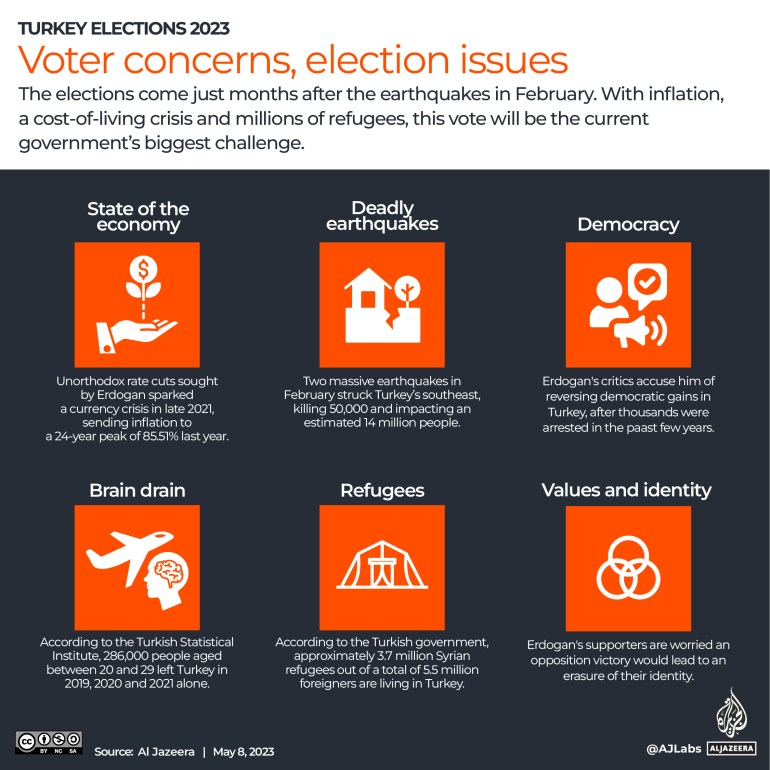
Istanbul, Turkey – The campaign leading up to Turkey’s elections this weekend has been marred by outbreaks of violence across the country.
Incidents of stone-throwing, physical attacks on election workers and gunmen shooting up party offices have all been recorded in recent weeks as Turkey heads towards knife-edge polls in which President Recep Tayyip Erdogan is seeking to extend his 20-year rule.
There are also concerns that the political rhetoric at election rallies could be igniting violence. Speaking at the weekend, Devlet Bahceli, head of the Nationalist Movement Party (MHP) that backs the government, denounced the opposition as “traitors [who] will get either aggravated life sentences or bullets in their bodies”.
In Turkey’s highly polarised political landscape, however, claims and counter-claims blur the facts surrounding incidents.
Savci Sayan, a parliamentary candidate for Erdogan’s Justice and Development Party (AK Party) in Izmir, western Turkey, said his campaign bus was attacked by opposition supporters on Monday night.
He said bus windows were broken and one of his advisers received a head wound when he was hit by a stone as the bus passed a café displaying posters supporting the opposition Republican People’s Party (CHP), which is strongly supported in Izmir.
“They insulted our esteemed president and me, broke the window of our bus, broke the head of my adviser,” said Sayan. “My adviser’s friends and the police barely rescued him.”
Sevda Erdan Kilic, a CHP parliamentarian for Izmir, however, claimed that it was Sayan and his supporters who attacked the café. “Savci Sayan and a group of about 30 people with him attacked a coffee house,” she said.
Her claim was disputed by Sayan. “Why are we going to attack when we are returning from work in the middle of the night?” he said, adding that despite “provocations … we have always kept silent for the safety and peace of our country.”
Imamoglu attack
The most serious incident occurred Sunday as the CHP’s Ekrem Imamoglu addressed crowds from the roof of his campaign bus in Erzurum, an eastern city that backed the AK Party in recent votes.
Imamoglu, the mayor of Istanbul, who has been named as one of several vice presidents if the opposition wins, was pelted with stones from behind the bus. Footage showed his team holding up umbrellas to protect him from the missiles before he was ushered away.
Seventeen people needed medical treatment and the opposition condemned what they called the police’s failure to intervene in the attack. About two dozen suspects were detained and later released pending investigation.
While there have been no deadly attacks during the campaign, the use of firearms is a cause for concern in a country where gun ownership, whether legal or illegal, is relatively common.
Last month a man opened fire on an AK Party office in Cukurova, in southern Adana province, with an automatic rifle. The building was empty, having been cleared following February’s earthquakes. There have been similar armed attacks on the offices of most political parties around the country.
A bloody past
Fears of political violence are very real in Turkey, where many remember the late 1970s when thousands were killed by political gangs. The bloodletting was stemmed after a military coup in 1980 but re-emerged when the Kurdistan Workers’ Party (PKK) launched its armed campaign against the Turkish state in 1984. Almost 40,000 people, the majority of them civilians, have died in that conflict.
Ahead of elections in June 2015, a bombing of a rally of the pro-Kurdish Peoples’ Democratic Party (HDP) in Diyarbakir, southeast Turkey, caused at least four deaths and hundreds of injuries.
Three years ago, Kemal Kilicdaroglu, now the main opposition candidate against Erdogan, was attacked by a mob while attending the funeral of a soldier in Ankara province. He was punched and had to seek cover in a nearby house as the crowd shouted, “Burn them, kill them.”
Erdogan also came close to being killed in a 2016 coup attempt that caused more than 280 deaths when rogue commandos stormed his holiday hotel in southwest Turkey.

Deniz Poyraz, a 38-year-old Kurdish woman, was shot dead in 2021 when a gunman said to have ultra-nationalist sympathies attacked the HDP’s office in Izmir.
During this campaign, violence has also broken out at polling stations outside Turkey. Some 1.8 million Turks living overseas cast their ballots in the two weeks leading to Tuesday.
In France, clashes between rival voters broke out at a polling station in Marseille, resulting in police firing tear gas and four people being hospitalised. Meanwhile, Dutch riot police were called to a brawl at a voting hall in Amsterdam.
Amid fears of further violence, Kilicdaroglu, who heads the CHP and is the candidate for a six-party opposition alliance, urged supporters to stay at home in the event of victory.
“When we win on election night, no one should take to the streets,” he said in a television interview last week. “Everyone should sit at home … Some people may come to cause provocation. Unknown armed people can take to the streets. We have to create an environment that will not allow this.”







